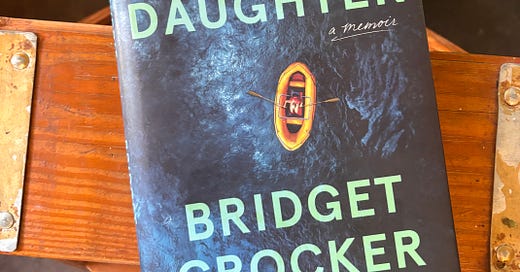Poverty and domestic abuse made an early appearance in Bridget Crocker’s life. Things had smoothed out by the time she lived in Jackson, Wyoming with her mom, stepfather and brother as a young teenager. One Easter Sunday morning, her mother blew it up. Easter lunch (nor life-as-usual) was not forthcoming. This was a blow for Crocker, whose stepfather Sully had been a stabilizing force. After her mother’s eruption, Crocker makes a go of living with her father in Ventura, California. Describing the results as mixed is an understatement. In California no one made fun of her for being poor. She also learned to hide bruises from her father’s beatings.
Going back and forth between these worlds was jarring.
“I thought about telling him that it wasn’t a fear of flying that made me anxious but having to change personalities midair. I switched into my mother’s daughter or my father’s daughter, depending on whether I was northbound or southbound. I had no memory of ever being my parents’ daughter, or even a singular version of myself. My anxiety over this identity shift had progressed over the years until I couldn’t fly between them without vomiting or getting headaches.” - Bridget Crocker, The River’s Daughter
What happens to Crocker is appalling. And yet, Crocker takes care of her readers. The author warning opening the book lets you know tough stuff is coming and the reader should skip ahead as needed when things get bleak. She writes swiftly through the painful parts.
What about the river? I confess to some pre-reading wariness. Would a book written by a long-time river guide be too carabiner-heavy for my reading pleasure? It wasn’t. (Are carabinerers used in rafting? I haven’t the slightest idea.) It was easy to track who was in or out of the boat at any given time. I understood differneces in how people get rafts through the Snake and Kern rivers in the Western United States as opposed to the Zambezi forming the border between Zimbabwe and Zambia.
The River’s Daughter took me by surprise (the best ones do). Beginning it I thought, “I’ll just see what I’m in for.” I was in for 129 pages before I considered my next move (i.e., “I should save some for tomorrow.”). Compelling story, well-written, by an admirable, formidable person (as one example, she scales the side of a cliff to get help for a friend who’s dying of dehydration).
Two more things I liked a lot:
1) In memoirs about tough parent/child relationships I often struggle relating to adult children who continually return to parents who never take ownership of their role in their kid’s experience. Crocker’s story is different. I want hand the book to my therapist and say, “Please read the last 25 pages while I sit here quitely. Then we’ll discuss.”
2) Reading about a person’s 20-something adventures that transpired in analog format.
My strong recommendation is to get your hands on The River’s Daughter straightaway. You won’t be sorry.
I’d love to hear your thoughts on The River’s Daughter. I’m also VERY CURIOUS what you’re up to Summer Reading-wise. The last few years I’ve been attracted to bookstore summer reading programs because (1) I love a printout and (2) tracking lovely things on an app (as my library encourages) reduces the loveliness of that thing.
This year I’m working Houston’s Blue Willow Bookshop’s bingo card. They also have a bookmark decorating contest.I won a bookmark design contest in first grade. Happy to report I’ve never gotten over it!
Wherever, however, you read this summer, I hope you make the most of it.
Happy reading,
Kelly
Notes:
https://www.spiegelandgrau.com/theriversdaughter/
https://bridgetcrocker.com/





I just picked up The River’s Daughter from a nearby library. Two ahead of it but looking forward to it after reading your review. Thanks Kelly.
My kind of book!